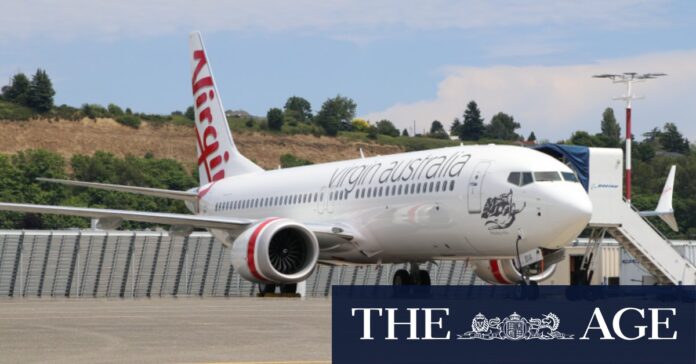[ad_1]
“We are squarely focused on implementing changes to strengthen quality across our production system and taking the necessary time to deliver high-quality airplanes that meet all regulatory requirements. We continue to stay in close contact with our valued customers about these issues and our actions to address them,” a spokesperson said.
Boeing is one of the biggest aircraft manufacturer in the world, with more than $130 billion in assets. It was prevented from expanding production of its newest narrow body line (known as the Max line) by the US aviation regulator, the Federal Aviation Administration, in January after the Alaska Airlines door plug incident.
Since then, global airline giants with strongholds far larger than Australia’s second biggest airline have adjusted their delivery timeframes for their looming Max orders including United and Southwest, with United casting doubt on the Boeing being able to meet any Max-10 delivery for the forseeable future.
“Boeing is not going to be able to meet its contractual deliveries on at least many of those airplanes, and let’s leave it at that,” United Airlines boss Scott Kirby told investors in January. United had been expecting 500 Max-10s.
Alaska Airlines also confirmed its order of 23 Max aircraft due to arrive this year had been delayed and Southwest said it would adjust its delivery timeframe to accommodate for the expected delays.
Virgin is controlled by private equity giant Bain Capital, which saved the airline from administration for $3.5 billion in November 2020. Bain had originally planned to float the airline business back onto the Australian Securities Exchange by the end of this year.

Former Virgin Australia chief executive Jayne Hrdlicka will not be able to see the airline through the IPO stage.Credit: Dan Peled
But earlier this month Virgin’s chief executive, Jayne Hrdlicka, abruptly announced her resignation and said she would not be able to see the airline through the IPO stage, which could take another three to five years.
Investors familiar with the plans who were not authorised to speak publicly said Bain had originally planned to sell Virgin as a leaner, meaner operation than its former iteration and a key part of this sell rests on its single-fleet type. Solely flying Boeing aircraft also means Virgin is more exposed than its bigger competitor, Qantas, in the event that the manufacturer’s current issues are not ironed out soon.
Bain cancelled its non-deal roadshow investor meetings in April last year and has not rescheduled them since. The business’ former chief development officer, David Marr, who was charged with leading the group’s plans to float, quit in October. The group’s head of investor relations, Chris Vagg, has also resigned. These retirements mean the three executives originally scheduled to pitch the potential float to investors have since left the business.
The Business Briefing newsletter delivers major stories, exclusive coverage and expert opinion. Sign up to get it every weekday morning.
[ad_2]
Source link


